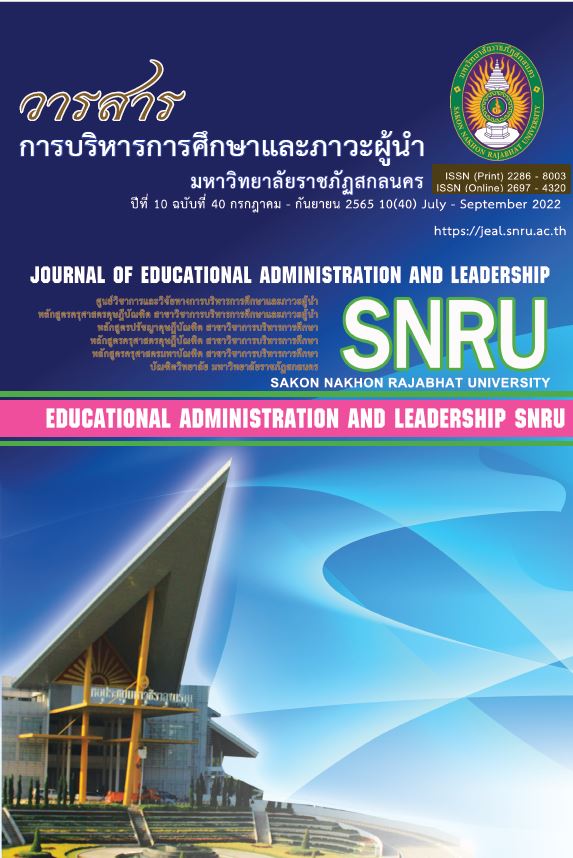

ปัจจัยทางการบริหารที่ส่งผลต่อประสิทธิผลการบริหารงานโรงเรียนมาตรฐานสากล สังกัดสำนักงานเขตพื้นที่การศึกษามัธยมศึกษา ในเขตพื้นที่สำนักงานศึกษาธิการภาค 11
The Administrative Factors Affecting the Administrative Effectiveness of World–Class Standard Schools under the Secondary Educational Service Office in the Regional Education Office No. 11
ผู้แต่ง
ศิริยากรณ์ จันทะราช, ศิกานต์ เพียรธัญญกรณ์, เพ็ญผกา ปัญจนะ
Author
Siriyakorn Jantarach, Sikan Pienthunyakorn, Penphaka Panjana
บทคัดย่อ
การวิจัยนี้มีความมุ่งหมายเพื่อศึกษา เปรียบเทียบ หาความสัมพันธ์ อำนาจพยากรณ์ และเพื่อหาแนวทางการพัฒนาปัจจัยทางการบริหารที่ส่งผลต่อประสิทธิผลการบริหารงานโรงเรียนมาตรฐานสากล สังกัดสำนักงานเขตพื้นที่การศึกษามัธยมศึกษา ในเขตพื้นที่สำนักงานศึกษาธิการภาค 11 ตามความคิดเห็นของผู้บริหารโรงเรียนและครูผู้สอนใช้กลุ่มตัวอย่างจำนวน 308 คน ประกอบด้วยผู้บริหารโรงเรียนจำนวน 45 คน และครูผู้สอนจำนวน 263 คน ในปีการศึกษา 2563 โดยใช้การคำนวนจากตารางของเครจซี่และมอร์แกน เครื่องมือที่ใช้ในการวิจัยเป็นแบบสอบถามมาตราส่วนประมาณค่า 5 ระดับ คือแบบสอบถามปัจจัยทางการบริหาร ที่มีค่าอำนาจจำแนกอยู่ระหว่าง 0.372 - 0.723 และมีค่าความเชื่อมั่น 0.970 และแบบสอบถามประสิทธิผลการบริหารงานโรงเรียนมาตรฐานสากล ที่มีค่าอำนาจจำแนกอยู่ระหว่าง 0.469 - 0.704 และค่าความเชื่อมั่น 0.948 สถิติที่ใช้ในการวิเคราะห์ข้อมูลได้แก่ ค่าร้อยละ ค่าเฉลี่ย ส่วนเบี่ยงเบนมาตรฐาน ทดสอบสมมติฐานโดยใช้ค่าทีชนิดอิสระต่อกัน (Independent Samples t-test) การวิเคราะห์ความแปรปรวนทางเดียว (One-Way ANOVA) การวิเคราะห์สหสัมพันธ์อย่างง่ายแบบเพียร์สัน (Pearson’s Product-Moment Correlation Coefficient) และการวิเคราะห์การถดถอยพหุคูณ (Stepwise Multiple Regression Analysis)
ผลการวิจัย พบว่า
1. ปัจจัยทางการบริหารและประสิทธิผลการบริหารงานโรงเรียนมาตรฐานสากล โดยภาพรวมและรายด้านทุกด้านอยู่ในระดับมาก
2. การเปรียบเทียบปัจจัยทางการบริหาร ตามความคิดเห็นของผู้บริหารโรงเรียนและครูผู้สอน จำแนกตามสถานภาพการดำรงตำแหน่ง โดยภาพรวมและรายด้านทุกด้าน แตกต่างกันอย่างมีนัยสำคัญทางสถิติที่ระดับ .01 จำแนกตามประสบการณ์ทำงานแตกต่างกัน โดยภาพรวมและรายด้านทุกด้านไม่แตกต่างกัน ส่วนจำแนกตามสังกัดสำนักงานเขตพื้นที่แตกต่างกัน โดยภาพรวมไม่แตกต่างกัน
3. การเปรียบเทียบประสิทธิผลการบริหารงานโรงเรียนมาตรฐานสากล ตามความคิดเห็นของผู้บริหารโรงเรียนและครูผู้สอน จำแนกตามสถานภาพการดำรงตำแหน่ง โดยภาพรวมแตกต่างกันอย่างมีนัยสำคัญทางสถิติที่ระดับ .01 จำแนกตามประสบการณ์ทำงาน โดยภาพรวมและรายด้านทุกด้านไม่แตกต่างกัน ส่วนจำแนกตามสังกัดสำนักงานเขตพื้นที่แตกต่างกัน โดยภาพรวมมีความคิดเห็นแตกต่างกันอย่างมีนัยสำคัญทางสถิติที่ระดับ .05
4. ปัจจัยทางการบริหารมีความสัมพันธ์ทางบวกกับประสิทธิผลการบริหารงานโรงเรียนมาตรฐานสากลอย่างมีนัยสำคัญทางสถิติที่ระดับ.01
5. ปัจจัยทางการบริหาร ด้านภาวะผู้นำ ด้านการบริหารงาน ด้านทรัพยากร และด้านโครงสร้างองค์การมีอำนาจพยากรณ์ประสิทธิผลการบริหารงานโรงเรียนมาตรฐานสากล สังกัดสำนักงานเขตพื้นที่การศึกษามัธยมศึกษาในเขตพื้นที่สำนักงานศึกษาธิการภาค 11 โดยภาพรวม อย่างมีนัยสำคัญทางสถิติที่ระดับ .01 มีอำนาจพยากรณ์ร้อยละ 84.90 และมีความคลาดเคลื่อนมาตรฐานของการพยากรณ์ ± 0.15080
6. การวิจัยครั้งนี้ได้เสนอแนวทางการพัฒนาปัจจัยทางการบริหารโรงเรียนมาตรฐานสากล ดังนี้ 6.1) ด้านโครงสร้างองค์การมีความชัดเจน มีการมอบหมายหน้าที่และภาระงานตามความรู้ความสามารถ 6.2) ด้านการบริหารงาน ผู้บริหารจัดประชุมเพื่อชี้แจงนโยบาย มีการนิเทศ กำกับ ติดตามและประเมินผลการดำเนินงานอย่างเป็นระบบ 6.3) ด้านทรัพยากร การจัดห้องเรียน แหล่งเรียนรู้ ห้องปฏิบัติการมีความพร้อม ปลอดภัย มีความทันสมัยและเพียงพอต่อความต้องการของนักเรียน และ 6.4) ด้านภาวะผู้นำ ผู้บริหารมีวิสัยทัศน์ บริหารแบบมีส่วนร่วม และตัดสินใจโดยคำนึงถึงประโยชน์สูงสุดของสถานศึกษา
Abstract
The purposes of this research were to examine, compare, determine the predictive power, and establish the guidelines for developing the administrative factors affecting the administrative effectiveness of world – class standard schools under the Secondary Educational Service Area Office in the Regional Education Office No. 11, as perceived by school administrators and teachers. The samples consisted of 308 participants, including 45 school administrators and 236 teachers in the academic year 2020. The sample size was determined based on Krejcie and Morgan’s table. The instruments for data collection were two sets of five-point rating scale questionnaires: a set of questionnaires on administrative factors with Its discrimination power ranging from 0.372 to 0.723 and the reliability of 0.970, and a set of questionnaires on administrative effectiveness of world – class standard schools with its discriminative power ranging from 0.469 to 0.704 and the reliability of 0.948. The statistics for data analysis were percentage, mean, standard deviation. The hypothesis testing was done through Independent Samples t-test, One-Way ANOVA, Pearson’s Product-Moment Correlation and Stepwise Multiple Regression Analysis.
The findings were as follows:
1. The administrative factors and the administrative effectiveness of world-class standard schools, as a whole and each aspect were rated at a high level.
2. The comparison results showed that the administrative factors as perceived by participants with different positions, as a whole and each aspect were different at the .01 level of significance, whereas in terms of work experience, there were no differences in overall and each aspect. In terms of different Educational Service Area Office, there were no differences in overall.
3. The comparison results showed that the administrative effectiveness of world – class standard schools as perceived by participants, classified by different positions, as a whole were different at the .01 level of significance, whereas in terms of work experience, there were no differences in overall and each aspect. In terms of different Educational Service Area Office, there were different at the .05 level of significance in overall.
4. The administrative factors had a positive relationship with the administrative effectiveness of the world-class standards schools at the .01 level of significance.
5. The administrative factors in terms of leadership (x5), administration (x5), resources (x4) and organizational structure (x2) could predict administrative effectiveness of world-class standard schools at the .01 level of significance in overall with the predictive power of 84.90 and the standard error of estimate of ± 0.15080.
6. This research proposed the guidelines for developing administrative factors of world-class standard schools as follows: 6.1) Organizational Structure. The organizational structure should be well-defined, assigned duties and tasks based on an individual’s competencies; 6.2) Administration. Administrators should hold regular meetings to keep personnel informed about organizational policies, and establish a systematic operation in terms of supervision, monitoring and assessment; 6.3) Resources, including classroom management, learning resources, and laboratories should be equipped, safe, modern, and sufficient to meet the needs of students; and 6.4) Leadership. Administrators should have a vision, adopt a participatory administration, and make decisions to provide maximum benefit to schools
คำสำคัญ
ปัจจัยทางการบริหาร ประสิทธิผลการบริหารงานโรงเรียนมาตรฐานสากลKeyword
Administrative Factors, Administrative Effectiveness of World–Class Standard SchoolsNotice: Undefined variable: dataSet in /var/www/html/ArticleView.php on line 116
Notice: Trying to access array offset on value of type null in /var/www/html/ArticleView.php on line 116
บทความทุกบทความเป็นลิขสิทธิ์ของ
Notice: Undefined variable: dataSet in /var/www/html/ArticleView.php on line 116
Notice: Trying to access array offset on value of type null in /var/www/html/ArticleView.php on line 116
เท่านั้น
กำลังออนไลน์: 13
วันนี้: 0
เมื่อวานนี้: 2,136
จำนวนครั้งการเข้าชม: 1,259,456
อาคารบัณฑิตวิทยาลัย ชั้น 2 ตำบลธาตุเชิงชุม อำเภอเมือง จังหวัดสกลนคร 47000
โทร/
แฟกซ์ 0-4297-0093
บรรณาธิการ: รองศาสตราจารย์ ดร.ไชยา ภาวะบุตร
ติดต่อ/สอบถาม: นายธีรเวทย์ เพียรธัญญกรณ์
โทร: 0-4297-0093